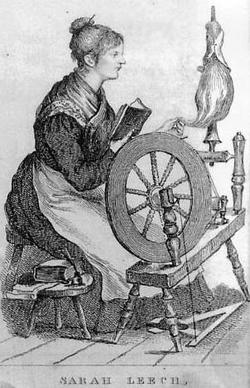Sarah Leech facts for kids
Quick facts for kids
Sarah Leech
|
|
|---|---|

Leech from the frontispiece of Poems on various subjects
|
|
| Born | 1809 Taughboyne, County Donegal
|
| Died | 1830 (aged 20–21) |
Sarah Leech (1809 - 1830) was an Irish poet. She was a very special writer because she was the only known female "weaver poet" to have her work published in Ireland. Weaver poets were people who wrote poems while working as weavers, making cloth. Sarah was also one of the few women of her time to publish poetry in the Ulster Scots dialect, which is a unique way of speaking and writing found in parts of Ireland and Scotland.
Contents
Sarah Leech's Life Story
Her Early Years and Education
Sarah Leech was born in 1809 in a place called Ballylennan, in Taughboyne, County Donegal. She was the youngest child in her family. Her father, Thomas Leech, worked as a weaver and a farmer. Her family were Protestant, likely Presbyterian.
When Sarah was only 3 years old, her father sadly passed away from a chest illness called pleurisy. This made things very hard for her family, and they struggled with money. Sarah's oldest sister, who had been to school, tried to teach her younger brothers and sisters to read. But she was very busy and didn't have much time.
When Sarah was 6, she went to school for just three months. Even though she was a bit scared of her teacher, she quickly learned how to read. She loved reading "story books" and wanted to learn even more. At age 12, she learned how to write. Around the same time, she started spinning linen yarn to help her family earn money. A kind person in the local area gave her some books and taught her about religion.
How Her Poems Were Discovered
Sarah started writing poems in 1822. Some of her poems were in English, and others were in the Ulster Scots dialect. One of her Ulster Scots poems, called Elegy on a loquacious old woman, became popular in her local area. A gentleman who was visiting read it. He was very interested in how funny and clever it was.
This gentleman looked for Sarah, copied her poems, and sent them to a newspaper called the Londonderry Journal to be published. We only know this person was "a graduate of Trinity College."
Challenges and Recognition
People who wrote about Sarah often felt very sympathetic towards her. They focused on her being an "orphan" (someone whose parents have died) and talked about her strong faith and how poor she was. In 1828, her only collection of poems, Poems on various subjects, was published. The person who edited her book wrote that Sarah had lived a life of "labour, indigence, and obscurity." This meant she worked hard, was poor, and not well-known. He hoped that any money made from the book would help her in her life.
Sarah became lame, meaning she had difficulty walking, and it seems she had a condition like rheumatoid arthritis, which affects joints. In 1826, she worried she was losing her eyesight. Because of this, she couldn't continue to teach or look after children. Even though her family was poor, they seemed to keep some respect in their community. In her book, there's a picture of Sarah with her spinning wheel, but she looks well-dressed. It's said that Sarah was very embarrassed by how her life was described in the Londonderry Journal, especially how it focused on her humble beginnings.
Later Life and Legacy
In 1822, Sarah and her mother moved to live near a place called Lettergull. The farm where she lived is still remembered by local people. A family there, the Gilfillans, even say they have Sarah Leech's spinning wheel, the one shown in the picture from her book! This farm was quite large for the area, over 70 acres. Some people think that Sarah's older sister might have married into the Gilfillan family and taken in Sarah and her mother.
Religion was a very important theme in Sarah's poems. In her English poems, she showed support for the Brunswick Clubs. These clubs were formed in 1828 to oppose Catholic emancipation, which was about giving more rights to Catholics. She also wrote about not trusting Catholic priests. However, it's possible she made these parts stronger to keep the support of the Church of Ireland gentleman who helped edit her poems before they were published.
Her poems written in the Ulster Scots dialect do not have these kinds of themes. They have become very popular recently, especially with efforts to promote the Ulster Scots language. Her book of poems was even republished in 2006 by the Ulster-Scots Agency. Some people believe that nothing more is known about Sarah Leech after her book came out in 1828. However, other sources say she died in 1830. To honor her, a special plaque was put up for Sarah Leech on December 13, 2014, in Raphoe, County Donegal.
 | Selma Burke |
 | Pauline Powell Burns |
 | Frederick J. Brown |
 | Robert Blackburn |

